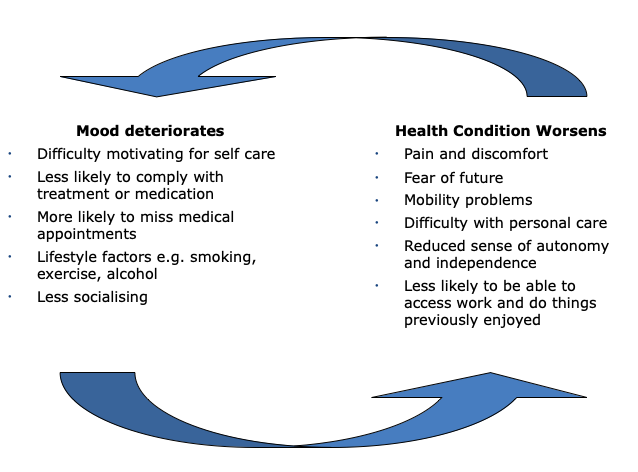Philosophers and scientists have debated about the relationship between our mind and physical bodies for a long time. I certainly align myself with a holistic approach. All you need to do is think about your favourite flavour ice-cream and notice the saliva in your mouth to know that there is a clear link between our thoughts and our physical responses!
I know from personal experience that long-term physical health problems can have a detrimental impact on our emotional wellbeing. The kinds of problems I am referring to here are conditions which medical intervention can help you to manage but can’t cure, such as diabetes, ulcerative colitis, chronic pain and epilepsy. Statistics suggest that 16.5 million people in the UK have at least one long term health condition. Of these, 30% also struggle with depression or anxiety.
This link between physical health problems and depression and/or anxiety is understandable but unfortunately it can form a vicious cycle where as one gets worse the other also declines.

How can CBT help to break this cycle?
A principal theory in Cognitive Behavioural Therapy is that our problems are not caused by the situations which we face but by how we choose to respond to them. So, whilst psychological therapy cannot take away a physical health problem it can help you to develop a different perspective and live as full a life as possible.
Previous clients I have worked with have often said how they value the time and space to talk about their health in therapy, “It’s a non-judgemental space where I can be myself rather than a list of symptoms”.
If you are starting therapy then let your therapist know about your physical health condition and consider if there is anything that might make therapy easier for you e.g. appointments at certain times of the day, online appointments, having a certain chair to sit in or being able to move around during the appointment.
Therapy can help you to explore the impact that your health condition has had on your life and to focus on what you can do, rather than on what you can’t do. There are often practical strategies such as breathing techniques, activity pacing, goal setting and problem-solving.
Don’t be defined by your long-term health condition, contact a CBT therapist today to explore how you can live life to the full!
Things to explore …

